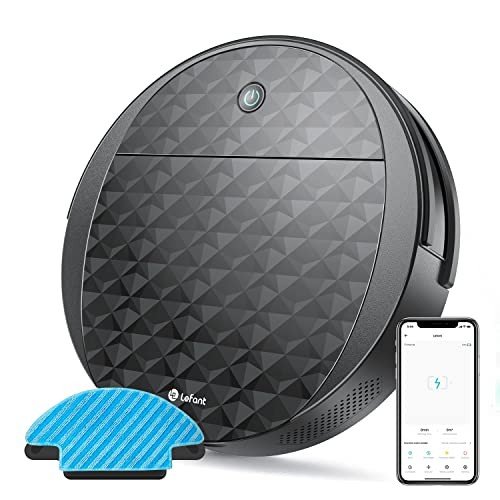Don't Forget Robot Vacuum Cleaner: 10 Reasons That You No Longer Need It

The Rise of Robot Vacuum Cleaners: A Comprehensive Guide
In the last few years, robotic innovation has actually penetrated different aspects of everyday life, considerably changing how tasks are achieved. Among robot cleaner UK in this area is the arrival of robot vacuum cleaners. These gadgets have moved from a luxury product to an essential family tool, supplying convenience and effectiveness to countless users around the world. This article will explore the mechanics, advantages, limitations, and popular models of robot vacuum cleaners, as well as address some frequently asked concerns.
What is a Robot Vacuum Cleaner?
A robot vacuum cleaner is an autonomous gadget created to clean floors without human intervention. Geared up with sensing units, brushes, and vacuum innovation, these small machines can browse a home, effectively selecting up dirt, dust, and debris. Lots of modern designs come with numerous functions, consisting of Wi-Fi capability, smartphone applications, and home mapping technology, which allow users to keep an eye on cleaning progress remotely.
How Robot Vacuum Cleaners Operate
Robot vacuums use numerous innovations to ensure efficient cleaning. Below are the primary components that add to their performance:
- Navigation Sensors: Most robot vacuums feature different sensors (infrared, ultrasonic, and so on) that assist detect obstacles, stairs, and walls, enabling the device to browse a room effectively.
- Suction Mechanism: The vacuum utilizes a suction system to gather dirt and dust from surfaces. Lots of models utilize sophisticated cyclonic technology to enhance suction power.
- Cleaning Brushes: Different types of brushes (side brushes, rolling brushes) assist in loosening up dirt and assisting debris into the vacuum's suction area.
- Battery System: Operating on rechargeable batteries, robot vacuums can clean up autonomously for a fixed period before going back to their docking station to recharge.
- Smart Features: Many models are geared up with Wi-Fi connection, enabling users to manage cleaning schedules, suction power, and zoning by means of smartphone apps. Some even support voice control through smart home devices like Amazon Alexa and Google Assistant.
Benefits of Robot Vacuum Cleaners
The combination of robot vacuum into everyday cleaning tasks provides numerous considerable advantages:
- Time-Saving: They carry out cleaning autonomously, allowing users to concentrate on other important activities.
- Consistent Cleaning: Robot vacuums can clean up on a regular schedule, guaranteeing that dirt and dust do not accumulate.
- Benefit: Most designs can be run while users run out your house, and even from remote locations through mobile phone apps.
- Area Efficient: With their compact style, they can access locations that standard vacuums can not, such as under furnishings and in tight areas.
- Smart Technology: The included functions, such as mapping and scheduling, supply users with boosted control over their cleaning routines.
Limitations of Robot Vacuum Cleaners
In spite of their various advantages, robot vacuums do include some restrictions:
- Initial Cost: High-quality robot vacuums can be more expensive than conventional vacuums, which might discourage some consumers.
- Handbook Assistance Needed: Robot vacuums may have problem with large particles or thick carpets, needing periodic manual vacuuming.
- Battery Life: Depending on the design and the size of the home, the battery life may limit how much area can be cleaned in one session.
- Upkeep: Regular upkeep, such as emptying the dustbin and cleaning brushes, is necessary to keep the vacuum operating successfully.
Popular Robot Vacuum Models
Here's a table comparing a few of the premier robot vacuum cleaners on the marketplace:
| Model | Suction Power | Battery Life | Smart Features | Cost Range |
|---|---|---|---|---|
| iRobot Roomba 980 | High | As much as 120 min | Wi-Fi, App Control, Alexa | ₤ 600 - ₤ 800 |
| Roborock S7 | Extremely High | Approximately 180 minutes | Mapping, Virtual Barriers, App | ₤ 400 - ₤ 600 |
| Ecovacs Deebot OZMO T8 | High | As much as 240 min | AI Smart Navigation, App Control | ₤ 600 - ₤ 700 |
| Neato Botvac D7 | High | Approximately 120 minutes | Mapping, Zone Cleaning | ₤ 600 - ₤ 700 |
| Shark IQ Robot | Moderate | Approximately 90 minutes | Self-Cleaning, App Control | ₤ 400 - ₤ 500 |
Frequently Asked Questions About Robot Vacuum Cleaners
Q1: Can robot vacuum replace conventional vacuums?
While robot vacuums can substantially decrease the requirement for conventional vacuuming, they are best used as a complementary tool instead of a complete replacement. For deep cleaning or larger debris, standard models may still be required.
Q2: Are robot vacuums efficient on all types of floor covering?
Many robot vacuums perform well on tough surfaces like tile and wood, in addition to low-pile carpets. However, users with high-pile carpets might find restricted efficiency and ought to think about specific models created for those surface areas.
Q3: How do robot vacuums handle pet hair?
Lots of models are specifically developed with effective suction and rubber brushes that efficiently collect animal hair from carpets and furniture. It's recommended to examine reviews focusing on family pet owners' experiences for better insights.
Q4: Do robot vacuums require much maintenance?
Robot vacuums do require some maintenance. Users should regularly clear the dustbin, tidy the brushes and sensors, and look for any obstructions to maintain ideal performance.
Robot vacuum have altered the cleaning landscape, using users time-saving, efficient, and hassle-free solutions to floor maintenance. While they may not totally replace standard vacuums, their integration into households symbolizes an advance in how we approach home cleanliness. As innovation continually develops, we can anticipate even more developments in this area-- making robot vacuums an ever-relevant family tool.

